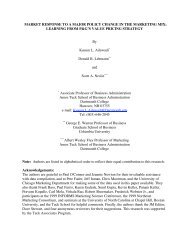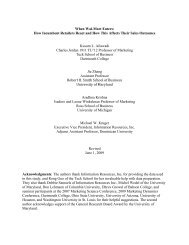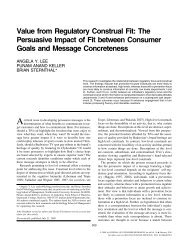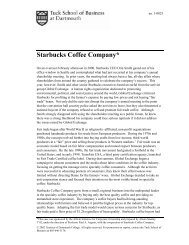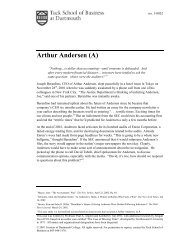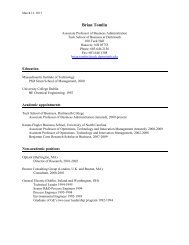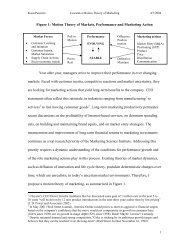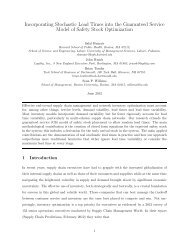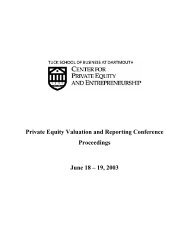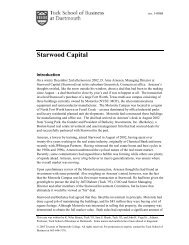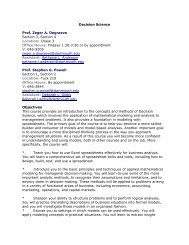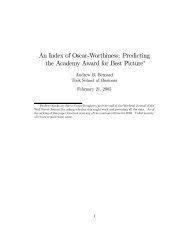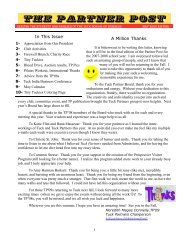tax notes international - Tuck School of Business - Dartmouth College
tax notes international - Tuck School of Business - Dartmouth College
tax notes international - Tuck School of Business - Dartmouth College
Create successful ePaper yourself
Turn your PDF publications into a flip-book with our unique Google optimized e-Paper software.
HIGHLIGHTS<br />
from the <strong>tax</strong> accounts in the financial statements can<br />
lead to erroneous and misleading inferences.’’<br />
The confidentiality <strong>of</strong> corporate <strong>tax</strong> returns, however,<br />
places researchers in an unenviable position.<br />
Either they apply to the IRS for permission to use confidential<br />
data, as many researchers have done, or they<br />
develop ways to tease <strong>tax</strong> information out <strong>of</strong> the financial<br />
reports. Shackelford and his coauthors chose the<br />
latter path and suggest ways to use this imperfect public<br />
information to better approximate information in<br />
the confidential <strong>tax</strong> return.<br />
Book-Tax Differences<br />
As Shackelford noted, accountants and the IRS frequently<br />
take different views <strong>of</strong> what constitutes income.<br />
For a given accounting definition, the differences<br />
in book and <strong>tax</strong> treatment largely arise from <strong>tax</strong> legislation<br />
designed to encourage a specific behavior, such as<br />
additional investment spending or simplification.<br />
These differences may be permanent or only temporary.<br />
For example, the <strong>tax</strong> law exempts municipal bond<br />
income from <strong>tax</strong>, while accounting rules include the<br />
income in book income. This creates a permanent difference<br />
between book and <strong>tax</strong> income and will drive<br />
down the reported effective <strong>tax</strong> rate (the income <strong>tax</strong><br />
expense divided by net income before <strong>tax</strong>es) in the financial<br />
statements. The income <strong>tax</strong> expense is the<br />
product <strong>of</strong> the statutory <strong>tax</strong> rate and book income adjusted<br />
for permanent differences.<br />
Temporary differences in book and <strong>tax</strong> income generally<br />
do not cause effective and statutory <strong>tax</strong> rates to<br />
differ. However, because permanent differences in book<br />
and <strong>tax</strong> income reduce the effective <strong>tax</strong> rate, corporate<br />
managers likely value transactions that reduce permanent<br />
income more highly than those that reflect only<br />
temporary differences in <strong>tax</strong> payments.<br />
Those differences have drawn the attention <strong>of</strong> many<br />
researchers. David Weisbach 2 and George Plesko 3 have<br />
argued that firms seek to enter <strong>tax</strong> shelters precisely<br />
because they permanently reduce income reported to<br />
the government while having no impact on financial<br />
statement earnings. Mihir Desai 4 suggests that the unexplained<br />
growth in book-<strong>tax</strong> differences may largely<br />
be explained by the growth in <strong>tax</strong> shelters. Jeri<br />
2 David Weisbach, ‘‘Ten Truths About Tax Shelters,’’ 55 Tax<br />
Law Review, 215-253 (2002).<br />
3<br />
George Plesko, ‘‘Corporate Tax Avoidance and the Properties<br />
<strong>of</strong> Corporate Earnings,’’ LVIII National Tax Journal, 729-737<br />
(2004).<br />
4<br />
Mihir Desai, ‘‘The Divergence Between Book Income and<br />
Tax Income,’’ Tax Policy and the Economy 17, edited by James M.<br />
Poterba, National Bureau <strong>of</strong> Economic Research and MIT Press<br />
(Cambridge, Mass.), 169-206 (2003).<br />
Seidman5 examined data from 1995 to 2004 and found<br />
that after narrowing during the 2001 economic downturn,<br />
the book-<strong>tax</strong> gap significantly widened in 2003<br />
partly because <strong>of</strong> earnings management.<br />
These book-<strong>tax</strong> differences are not inconsequential.<br />
As the Senate Homeland Security and Governmental<br />
Affairs Permanent Subcommittee on Investigations6 noted when investigating the collapse <strong>of</strong> Enron, the<br />
firm regularly showed positive financial earnings while<br />
reporting losses for <strong>tax</strong> purposes. The committee’s report<br />
concluded that:<br />
some U.S. financial institutions have been designing,<br />
participating in, and pr<strong>of</strong>iting from complex<br />
financial transactions explicitly intended to help<br />
U.S. public companies engage in deceptive accounting<br />
or <strong>tax</strong> strategies. This evidence also<br />
shows that some U.S. financial institutions and<br />
public companies have been misusing structured<br />
finance vehicles, originally designed to lower financing<br />
costs and spread investment risk, to carry<br />
out sham transactions that have no legitimate<br />
business purpose and mislead investors, analysts,<br />
and regulators about companies’ activities, <strong>tax</strong><br />
obligations, and true financial condition.<br />
While no one has yet accused any <strong>of</strong> the companies<br />
involved in the current financial crisis <strong>of</strong> engaging in<br />
Enron-style abuses, I believe something seems wrong<br />
when a company can regularly report high, positive<br />
earnings to the financial community while reporting<br />
low or no <strong>tax</strong>able income to the <strong>tax</strong> authorities.<br />
The Treasury Department had already placed book<strong>tax</strong><br />
differences under suspicion in its 1999 <strong>tax</strong> shelter<br />
study. (See Doc 1999-22641 or 1999 WTD 128-43 and Doc<br />
1999-22867 or 1999 WTD 128-44.) Whether <strong>tax</strong> shelters<br />
or other, innocuous <strong>tax</strong> planning explains today’s book<strong>tax</strong><br />
differences has yet to be determined. I believe the<br />
IRS is years away from providing the data necessary to<br />
determine the extent to which a favorable interaction<br />
between financial and <strong>tax</strong> reporting contributed to the<br />
current financial crisis.<br />
Shining a Spotlight on the Accounts<br />
Because corporate <strong>tax</strong> returns are not public, it is<br />
difficult to determine whether book-<strong>tax</strong> differences indicate<br />
that the firm is participating in a <strong>tax</strong> shelter or<br />
whether it has legitimate <strong>tax</strong> deductions. Researchers<br />
without access to <strong>tax</strong> data have had to look elsewhere.<br />
5<br />
Jeri Seidman, ‘‘Interpreting Fluctuations in the Book-Tax<br />
Income Gap as Tax Sheltering: Alternative Explanations,’’ working<br />
paper, University <strong>of</strong> Texas (2008).<br />
6<br />
U.S. Congress, Senate Committee on Governmental Affairs,<br />
‘‘Report on Fishtail, Bacchus, Sundance, and Slapshot: Four Enron<br />
Transactions Funded and Facilitated by U.S. Financial Institutions,’’<br />
Permanent Subcommittee on Investigations, Jan. 2,<br />
2003. For a reference to the study, see Doc 2003-511 or 2003 TNT<br />
2-22.<br />
372 • FEBRUARY 2, 2009 TAX NOTES INTERNATIONAL<br />
(C) Tax Analysts 2009. All rights reserved. Tax Analysts does not claim copyright in any public domain or third party content.



